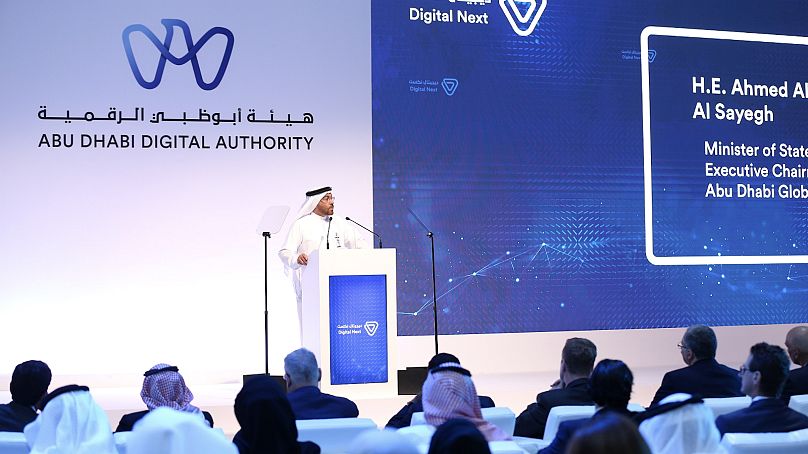The first Digital Next Summit has opened in Abu Dhabi, in the United Arab Emirates, gathering government leaders, advisors and experts to examine the use of digital technologies in the public and private sectors.
The first Digital Next Summit has opened in Abu Dhabi, in the United Arab Emirates, gathering government leaders, advisors and experts to examine the use of digital technologies in the public and private sectors.
 ADVERTISEMENT
ADVERTISEMENT
 ADVERTISEMENT
ADVERTISEMENT
The first day of the event, running on December 8th and 9th, has hosted 34 speakers and topics of discussion included geospatial data, digitalising telecommunications and the use of cloud technology to accelerate government innovation.
More than a thousand attendees are expected at the summit, exploring new ideas and listening to experts who are shaping the global digital future.
"WE CANNOT AFFORD TO NOT BE DIGITAL ANYMORE"
The Director General of the Abu Dhabi Digital Authority (ADDA), H.E. Dr. Rauda Al Saadi, made the inaugural speech saying that focal points for the government included using digitalisation to provide better integration between different entities, as well as improving customer service.
Khawla Al Fahim, ADDA’s Director of Spatial Data Infrastructure, told Euronews that the hype behind new technologies should not overshadow the true benefits that it can provide.
“Our key target is to provide better, faster and more accurate services,” she said, “It's not about people using A.I. as the new technology trend, but it's more like how can we use A.I. to better us as a government and provide services to the community.”
“We are aligning all of our efforts when it comes to data management, cybersecurity technology and even the infrastructure to have this collective of bank of information that will help in giving better services to the public,” she added.
UAE government officials speaking today at the event included H.E. Omar bin Sultan Al Olama, Minister of State for Artificial Intelligence, H.E. Dr. Thani bin Ahmed Al Zeyoudi, Minister of Climate Change and Environment and H.E. Ahmed Ali Al Sayegh, Minister of State and Executive Chairman of the Abu Dhabi Global Markets.
Al Sayegh took the stage to highlight how technology is enabling government and business to advance. He added that, in this regard, leaders should take calculated risks that will contribute to resilience. “As we approach a new decade, we cannot afford to not be digital anymore,” he concluded.
According to the International Data Corporation (IDC), the annual spending on digital technologies across the Middle East, Turkey, and Africa will reach $40 billion (€36 billion) by 2020.
CHALLENGES AND OPPORTUNITIES OF DIGITAL TRANSFORMATION IN THE MENA REGION
Jason Gartner, IBM’s Vice President of Worldwide Hybrid Cloud Integration Sales discussed digital transformation. Speaking to Euronews, he said one of the biggest challenges in this process is finding people with the right skills, as well as providing a collaborative environment.
“Traditionally, we've worked either in very siloed organizations where I.T. worked separately from business, which worked very separately from the security division, for example,” Gartner explained, adding that this is particularly where cloud-based systems can help. “It's really about providing that platform so that multiple organizations and ecosystems can then work together to make one small idea or one small innovation work together with many others, which really creates that digital transformation,” he added.
Looking particularly at the Middle East, Gartner believes that the region has a distinct advantage when it comes to digitalisation: “They don't really necessarily have the same level of baggage or infrastructure that they need to be able to bring forward into the next generation, so they have the ability to really build things from scratch, innovate from from new leverage, new technologies without having to worry about some of the backend systems that are holding back some of the traditional organization and traditional applications,” he said.
Estonia’s Minister of Defence, Jüri Luik was amongst the international names speaking at the event, followed by Hayden Stafford, Corporate Vice President of Worldwide Business Applications of Microsoft who spoke about democratising digital technologies.
Discussions on 5G network, cybersecurity and education are expected for the second day of the summit.
According to a study by McKinsey, despite government initiatives towards digitalisation, only 6 percent of people in the Middle East had access to a digitised smart government in 2016. The hope with summits such as Digital Next is that more countries in the region are able to apply new technologies and improve the daily lives of its citzens.













